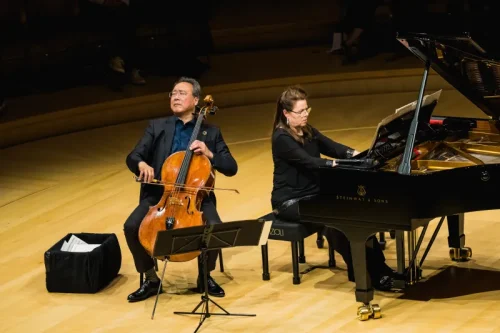 United States Various: Yo-Yo Ma (cello), Kathryn Stott (piano). Presented by San Francisco Symphony, Davies Symphony Hall, San Francisco, 2.4.2024. (HS)
United States Various: Yo-Yo Ma (cello), Kathryn Stott (piano). Presented by San Francisco Symphony, Davies Symphony Hall, San Francisco, 2.4.2024. (HS)

Fauré – ‘Berceuse’, Op.16; ‘Papillon’, Op.77
Dvořák – ‘Songs My Mother Taught Me’
Sérgio Assad – ‘Menino’
Nadia Boulanger – ‘Cantique’
Shostakovich – Cello Sonata in D minor, Op.40
Pärt – ‘Spiegel im Spiegel’
Franck – Violin Sonata in A major (transcribed for cello)
Cellist Yo-Yo Ma and pianist Kathryn Stott have been playing recitals together for four decades. To say they were on the same page in their recital in San Francisco was not at all surprising. What that unanimity created in music, from the spiritual simplicity of Arvo Pärt to the dexterity required for sonatas by Dmitri Shostakovich and César Franck, was nothing short of breathtaking.
The audience in a packed Davies Hall sat enthralled by the proceedings. It did not hurt that Ma made a point of noting that Stott plans to step away from performing at the end of this year. That this would be their last performance in San Francisco, a regular stop in previous years, added a frisson of poignancy to a program already aimed at the heartstrings. It is a collection assembled by Stott of pieces they played and recorded over the years.
The program, to be repeated on an April tour that takes them to Los Angeles, Boston, New York, Philadelphia and Washington, touches on a shared history that traces back to previous generations. Stott studied with famed teacher and composer Nadia Boulanger at the Menuhin School near London, and Ma’s college professor had been taught by Luise Vosgerchian, who also studied with Boulanger.
The program opened with a suite that began with two songs without words by French composer Gabriel Fauré, himself a mentor and friend to Boulanger. The Fauré songs bracketed Boulanger’s lovely ‘Cantique’, Dvořák’s ‘Songs My Mother Taught Me’ and the Brazilian guitarist Sergio Assad’s ‘Menino’, which Ma and Stott included in their 2003 album, Obrigado Brazil, in a piano-cello arrangement. The suite sailed smoothly, a study in fully realized and detailed phrasing, balance and intent.
All that sweetness was followed by a stunningly precise performance of Shostakovich’s Cello Sonata in D minor, which Ma introduced as ‘speaking truth to power’. Although the piece debuted before Stalin’s infamous condemnation of the composer over Lady Macbeth of Mtsensk, its sweet lyricism does indeed gradually give way to one of Shostakovich’s tough-minded marches and to tart dissonances as it develops.
Ma and Stott caught these emotional hooks deftly, the transitions occurring with a naturalness that sneaked up on a listener, as the composer had intended. Stott matched Ma’s ability to toss off the music with impeccable virtuosity, no matter how challenging the execution, making it all feel organic.
After the intermission came Pärt’s ‘Spiegel im Spiegel’, in its original string soloist-and-piano version. Like his trendsetting ‘Fratres’, which debuted a year before, this experiment in early minimalism was distinctive for its ethereal aspects. The mirrors in the title apply to the whole-note solo line, which goes up the scale against a simple, broken-chord accompaniment, only to descend on different notes as if on reflection. This is a fine example of what made Pärt’s pieces magical for many of us.
Images of Earth and outer space, taken by the Hubbell and Webb telescopes and projected on a screen above the players, added an extra dimension. Stott had introduced the piece as a ‘moment of peace’ after the energetic Shostakovich sonata. And indeed it was. Subtle changes in dynamics and tone from both musicians added depth to the music.
The program concluded with César Franck and the showy Violin Sonata in A major. Franck himself sanctioned a version for cello credited to cellist Jules Delsart, a contemporary of Franck’s, but Ma played from the violin score. Written for Eugene Ysaÿe, the piece does not lack for technical challenges for violinists, and Ma’s accuracy at the top of the cello’s range made the music feel utterly natural. Each return of the main themes – which pop up again and again through all four movements – managed to be simultaneously familiar and fresh. Best of all, the wandering momentum changes came together gradually over the piece’s thirty minutes, gathering the music into a rousing finale.
The two encores seemed to be spontaneous since Ma did not have the music and had to slide his chair closer to Stott’s bench to read over her shoulder. They started with a heartfelt and idiomatic traversal of Ernest Bloch’s ‘Prayer’ from the suite ‘From Jewish Life’, which the duo recorded on their recent album, Songs of Comfort. After that soulful moment came a dazzler, the Brazilian pianist and composer Cesar Camargo Mariano’s ‘Cristal’. If the balance between the two musicians muddied the cello’s melodic line from time to time, the sheer energy was enough to send the audience out into the cool San Francisco evening smiling.
Harvey Steiman
